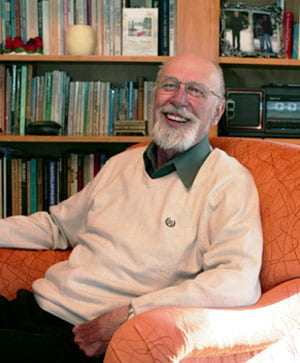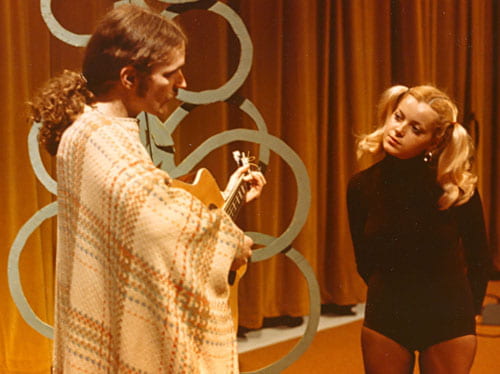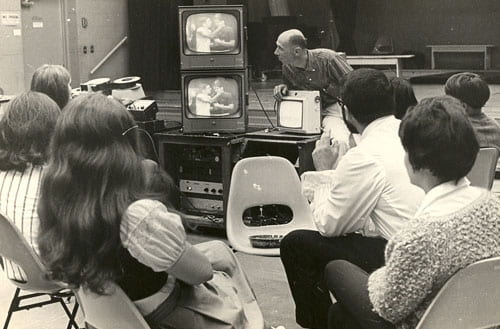In Memoriam: Prof. Emeritus Frisch remembered as Theatre pioneer, beloved teacher

Prof. Emeritus Jack Frisch
It is perhaps telling that Prof. Emeritus Jack Frisch bookended his storied UW-Green Bay career by directing Samuel Beckett’s “Waiting for Godot.”
After all, Frisch was well known for pushing the theatrical envelope, and “Godot” is renowned as a groundbreaking work in the so-called “Theatre of the Absurd.” It didn’t adhere to conventions — and neither did he.
“It was a time of protest, and there was a school of thought that college theatre should be stretching limits, pushing the envelope,” Fritsch said in a 2009 interview with UW-Green Bay News. “I thought we should do provocative works here, too.”
Presenting those works became one hallmark of a storied University career for Frisch, who embraced the unconventional on stage and in the classroom. His three decades at UW-Green Bay began before there was a UW-Green Bay — he joined the faculty of the UW Center-Green Bay in 1962.
Frisch, 84, a University theatre pioneer and beloved professor, died Tuesday (April 30) at a Green Bay hospital.
“I’ve always looked at theater — for my casts, myself and audiences — as entertaining, but more than entertaining,” Frisch told Green Bay Press-Gazette critic Warren Gerds in 1992. “It seems to me that theater, especially for the cutting edge of it, has important things to say to us human beings, as social creatures.”
Frisch explored those statements in a variety of ways after helping found the collegiate theatre program at UW-Green Bay in the late 1960s. During his career, he directed more than 100 plays in campus and community theatre productions, most for UW-Green Bay, Harlequin Players — a local troupe he founded — or UW-Green Bay Community Theatre. Credits include Edward Albee’s “Who’s Afraid of Virginia Woolf,” Tennessee Williams’ “Summer and Smoke,” Kurt Vonnegut’s “Happy Birthday, Wanda Jane,” William Saroyan’s “Beautiful People,” “Ashes” by David Rudkin, and the Peter Weiss play “Marat/Sade.”
(Story continues below, but click thumbnails to enter slideshow view for vintage playbills, reviews and publicity stills.)












But for UW-Green Bay Theatre and Dance Prof. Jeffrey P. Entwistle, it’s Frisch’s original production, “Gaia Gaea,” that stands out all these years later. Entwistle, a longtime friend and colleague, recalled Tuesday how Frisch created the production with his cast and designers through an experimental rehearsal process.
“It was an otherworldly piece that began with this creative team’s own version of creation and involved the research of petroglyphs and the creation of petroglyph imagery in sand on the stage,” Entwistle said. “It was a performance that took us through the development of man and the mother earth.
“It was such a striking and original performance and the brainchild of a colleague who had a love of the earth and the environment, a love of the theatre, and great love for his students and their creative potential.”

Frisch often focused on theatre with a social conscience, Entwistle said, and reveled in the writings of the late Czech writer, dissident and politician Vaclav Havel. And of course, he loved experimental theatre.
Consider 1968’s “King Ubu,” a UW Center production staged just months before the four-year UW-Green Bay campus was set to open. Described in a 2009 edition of UW-Green Bay’s Inside magazine as a bawdy, “free-form ‘happening’ overflowing with chaos and broad humor,” the show greeted theatregoers with “costumed actors doubling as ushers or milling about, hurling rolls of toilet paper at one another.”
One of those theatregoers, unrecognized to all but Frisch, was founding UW-Green Bay Chancellor Edward Weidner. Frisch, the story recalls, “watched with interest as Susan Sloan, the actress playing the padded, outrageously-bosomed Mother Ubu, escorted the new chancellor to his seat … and promptly jumped in his lap.”
Frisch couldn’t see Weidner’s reaction from where he sat, he recalled. “Me?” Frisch said. “I was laughing my head off.”
Frisch never heard a word from Weidner about the incident — and so he kept stretching limits and pushing the provocative, the unconventional and avant garde
Frisch also was known for bringing an element of the unexpected to his classroom, where he taught an array of courses in theatre production and dramatic literature, as well as courses in American Indian Studies (now First Nations Studies) and interpersonal communication (an intro course was lovingly dubbed “Touchy-Feely 101”).
Frisch taught courses on festivals and games, and is credited with introducing students and the larger Green Bay area to “Earth Ball” — played with a six-foot-wide ball and a focus on cooperation, not competition — and other innovative games. His style resonated with those he taught.
“One of my favorite memories will be watching Jack during graduation ceremonies,” Entwistle said, “as I had never seen so many students smiling and saying thanks to a professor as they would march by, and I realized how many lives he touched through his interpersonal communication classes.”
And in so many other ways.

“Although I now have come to the realization that he will no longer pop his head in my office door to have a chat,” Entwistle said, “the memories of the work and many conversations and time we spent together will never leave my mind.”
And though Frisch was known for the offbeat, it was the quote of a more traditional playwright his passing brought to Entwistle’s mind Tuesday.
“Now cracks a noble heart. Good-night, sweet prince;
And flights of angels sing thee to thy rest.”
— William Shakespeare, Hamlet
A service for Jack Frisch will be held from 9-11 a.m. Saturday, May 4, at Malcore Funeral Home, 701 N. Baird St., Green Bay, WI 54302, just off University Avenue.


